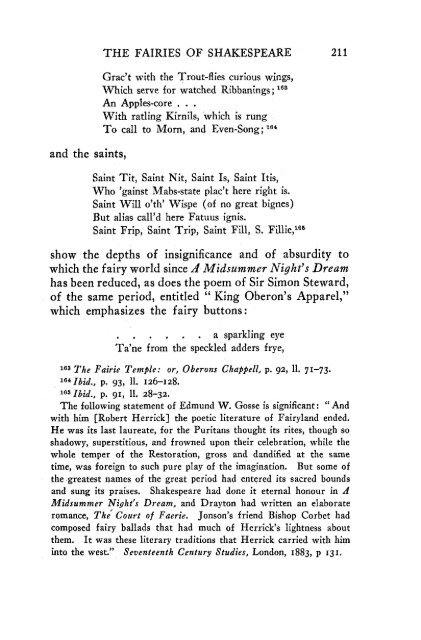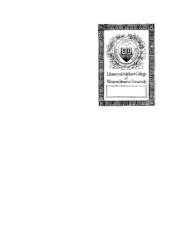- Page 1 and 2:
COLUMBIA UNIVERSITY STUDIES IN ENGL
- Page 3 and 4:
THE ELIZABETHAN FAIRIES THE FAIRIES
- Page 5 and 6:
TO MY MOTHER LOUISA WHITE LATHAM
- Page 7 and 8:
viii PREFACE suggested the subject
- Page 9 and 10:
Library ofAdelbert~G1lcge of Westem
- Page 11 and 12:
2 INTRODUCTION ence between the fai
- Page 13 and 14:
4 INTRODUCTION of the existence, in
- Page 15 and 16:
6 INTRODUCTION dive of the Romance
- Page 17 and 18:
8 INTRODUCTION English fairies from
- Page 19 and 20:
10 INTRODUCTION former, the fairies
- Page 21 and 22:
12 INTRODUCTION thology of the 16th
- Page 23 and 24:
14 INTRODUCTION and treatises on th
- Page 25 and 26:
16 INTRODUCTION repeatedly to the f
- Page 27 and 28:
18 INTRODUCTION with fairy lore und
- Page 29 and 30:
20 INTRODUCTION Virgil,54 The Flyti
- Page 31 and 32:
INTRODUCTION And foodlesse famin. W
- Page 33 and 34:
24 ORIGIN AND NATURE literary inven
- Page 35 and 36:
2 6 ORIGIN AND NATURE classifying t
- Page 37 and 38:
28 ORIGIN AND NATURE as long as the
- Page 39 and 40:
30 ORIGIN AND NATURE That they were
- Page 41 and 42:
32 ORIGIN AND NATURE walking of sou
- Page 43 and 44:
34 ORIGIN AND NATURE This is appare
- Page 45 and 46:
36 ORIGIN AND NATURE The fairies wh
- Page 47 and 48:
38 ORIGIN AND NATURE. ran one charm
- Page 49 and 50:
40 ORIGIN AND NATURE taile in his b
- Page 51 and 52:
42 ORIGIN AND NATURE pe maister-dra
- Page 53 and 54:
44 ORIGIN AND NATURE them, in 1645,
- Page 55 and 56:
46 ORIGIN AND NATURE The connection
- Page 57 and 58:
48 ORIGIN AND NATURE In addition to
- Page 59 and 60:
5 0 ORIGIN AND NATURE These woods (
- Page 61 and 62:
52 ORIGIN AND NATURE That she shoul
- Page 63 and 64:
54 ORIGIN AND NATURE the latter par
- Page 65 and 66:
ORIGIN AND NATURE ABBOT. But doubt,
- Page 67 and 68:
58 ORIGIN AND NATURE The laws of Sc
- Page 69 and 70:
60 ORIGIN AND NATURE They were also
- Page 71 and 72:
62 ORIGIN AND NATURE In connection
- Page 73 and 74:
64 ORIGIN AND NATURE prove their ex
- Page 75 and 76:
66 APPEARANCE AND CHARACTERISTICS m
- Page 77 and 78:
68 APPEARANCE AND CHARACTERISTICS s
- Page 79 and 80:
70 APPEARANCE AND CHARACTERISTICS o
- Page 81 and 82:
72 APPEARANCE AND CHARACTERISTICS H
- Page 83 and 84:
74 APPEARANCE AND CHARACTERISTICS G
- Page 85 and 86:
76 APPEARANCE AND CHARACTERISTICS T
- Page 87 and 88:
78 APPEARANCE AND CHARACTERISTICS T
- Page 89 and 90:
80 APPEARANCE AND CHARACTERISTICS I
- Page 91 and 92:
82 APPEARANCE AND CHARACTERISTICS I
- Page 93 and 94:
84 APPEARANCE AND CHARACTERISTICS g
- Page 95 and 96:
86 APPEARANCE AND CHARACTERISTICS T
- Page 97 and 98:
88 APPEARANCE AND CHARACTERISTICS o
- Page 99 and 100:
90 APPEARANCE AND CHARACTERISTICS s
- Page 101 and 102:
92 APPEARANCE AND CHARACTERISTICS T
- Page 103 and 104:
94 APPEARANCE AND CHARACTERISTICS t
- Page 105 and 106:
96 APPEARANCE AND CHARACTERISTICS 2
- Page 107 and 108:
98 APPEARANCE AND CHARACTERISTICS I
- Page 109 and 110:
100 APPEARANCE AND CHARACTERISTICS
- Page 111 and 112:
102 APPEARANCE AND CHARACTERISTICS
- Page 113 and 114:
104 APPEARANCE AND CHARACTERISTICS
- Page 115 and 116:
106 APPEARANCE AND CHARACTERISTICS
- Page 117 and 118:
108 APPEARANCE AND CHARACTERISTICS
- Page 119 and 120:
110 APPEARANCE AND CHARACTERISTICS
- Page 121 and 122:
112 EARTHLY LIFE OF FAIRIES air and
- Page 123 and 124:
EARTHLY LIFE OF FAIRIES . . . feare
- Page 125 and 126:
116 EARTHLY LIFE OF FAIRIES eaten u
- Page 127 and 128:
118 EARTHLY LIFE OF FAIRIES than I
- Page 129 and 130:
120 EARTHLY LIFE OF FAIRIES charact
- Page 131 and 132:
122 EARTHLY LIFE OF FAIRIES Yet, in
- Page 133 and 134:
124 EARTHLY LIFE OF FAIRIES Nor wer
- Page 135 and 136:
126 EARTHLY LIFE OF FAIRIES Dominio
- Page 137 and 138:
EARTHLY LIFE OF FAIRIES But mum con
- Page 139 and 140:
130 EARTHLY LIFE OF FAIRIES them as
- Page 141 and 142:
132 EARTHLY LIFE OF FAIRIES And suc
- Page 143 and 144:
EARTHLY LIFE OF FAIRIES Then must I
- Page 145 and 146:
136 EARTHLY LIFE OF FAIRIES in A Mi
- Page 147 and 148:
138 EARTHLY LIFE OF FAIRIES lowing
- Page 149 and 150:
140 EARTHLY LIFE OF FAIRIES give no
- Page 151 and 152:
142 EARTHLY LIFE OF FAIRIES And whe
- Page 153 and 154:
144 EARTHLY LIFE OF FAIRIES her Mai
- Page 155 and 156:
146 EARTHLY LIFE OF FAIRIES In cont
- Page 157 and 158:
THE CHANGELING AND THE WITCH The mo
- Page 159 and 160:
150 CHANGELING AND WITCH Beyond the
- Page 161 and 162:
152 CHANGELING AND WITCH But take y
- Page 163 and 164:
154 CHANGELING AND WITCH Cradles, a
- Page 165 and 166:
CHANGELING AND WITCH Curst in their
- Page 167 and 168:
158 CHANGELING AND WITCH It is inte
- Page 169 and 170: CHANGELING AND WITCH Thus when a Ch
- Page 171 and 172: CHANGELING AND WITCH Bring the holy
- Page 173 and 174: 164 CHANGELING AND WITCH witches wa
- Page 175 and 176: CHANGELING AND WITCH I would haue s
- Page 177 and 178: 168 CHANGELING AND WITCH that ignor
- Page 179 and 180: 170 CHANGELING AND WITCH " was both
- Page 181 and 182: 172 CHANGELING AND WITCH Ansuerit,
- Page 183 and 184: 174 CHANGELING AND WITCH and wilbe
- Page 185 and 186: THE FAIRIES OF SHAKESPEARE Although
- Page 187 and 188: 178 THE FAIRIES OF SHAKESPEARE is f
- Page 189 and 190: 180 THE FAIRIES OF SHAKESPEARE " sp
- Page 191 and 192: 182 THE FAIRIES OF SHAKESPEARE misc
- Page 193 and 194: 184 THE FAIRIES OF SHAKESPEARE give
- Page 195 and 196: 186 THE FAIRIES OF SHAKESPEARE tain
- Page 197 and 198: 188 THE FAIRIES OF SHAKESPEARE of t
- Page 199 and 200: 190 THE FAIRIES OF SHAKESPEARE with
- Page 201 and 202: 192 THE FAIRIES OF SHAKESPEARE Whet
- Page 203 and 204: 194 THE FAIRIES OF SHAKESPEARE Drea
- Page 205 and 206: 196 THE FAIRIES OF SHAKESPEARE ally
- Page 207 and 208: 198 THE FAIRIES OF SHAKESPEARE . .
- Page 209 and 210: 200 THE FAIRIES OF SHAKESPEARE due
- Page 211 and 212: 202 THE FAIRIES OF SHAKESPEARE the
- Page 213 and 214: 204 THE FAIRIES OF SHAKESPEARE The
- Page 215 and 216: 206 THE FAIRIES OF SHAKESPEARE what
- Page 217 and 218: 208 THE FAIRIES OF SHAKESPEARE In t
- Page 219: 2 10 THE: FAIRIES OF SHAKESPEARE Th
- Page 223 and 224: 2 14 THE FAIRIES OF SHAKESPEARE Of
- Page 225 and 226: 216 THE FAIRIES OF SHAKESPEARE whic
- Page 227 and 228: 218 THE FAIRIES OF SHAKESPEARE name
- Page 229 and 230: 220 ROBIN GOODFELLOW fellow, this "
- Page 231 and 232: 222 ROBIN GOODFELLOW writing, and w
- Page 233 and 234: 224 ROBIN GOODFELLOW In the early p
- Page 235 and 236: 226 ROBIN GOODFELLOW honest Puck 26
- Page 237 and 238: 228 ROBIN GOODFELLOW and 14th 34 ce
- Page 239 and 240: 230 ROBIN GOODFELLOW E~ithalamion,~
- Page 241 and 242: 232 ROBIN GOODFELLOW Hobgoblins, &
- Page 243 and 244: 234 ROBIN GOODFELLOW Dubitatur adhu
- Page 245 and 246: 236 ROBIN GOODFELLOW erous qualitie
- Page 247 and 248: 238 ROBIN GOODFELLOW would lay it u
- Page 249 and 250: 240 ROBIN GOODFELLOW His figure and
- Page 251 and 252: 242 ROBIN GOODFELLOW and could chan
- Page 253 and 254: 244 ROBIN GOODFELLOW Not content wi
- Page 255 and 256: 246 ROBIN GOODFELLOW Shakespeare in
- Page 257 and 258: 248 ROBIN GOODFELLOW against the tr
- Page 259 and 260: 250 ROBIN GOODFELLOW he lamented th
- Page 261 and 262: 252 ROBIN GOODFELLOW don, and Wily
- Page 263 and 264: 254 ROBIN GOODFELLOW namely, an inc
- Page 265 and 266: 256 ROBIN GOODFELLOW tale and in fo
- Page 267 and 268: 258 ROBIN GOODFELLOW of country men
- Page 269 and 270: ROBIN GOODFELLOW The fiend hath muc
- Page 271 and 272:
2 62 ROBIN GOODFELLOW To leave Robi
- Page 273 and 274:
264 AUTHORITIES AND TEXTS CONSULTED
- Page 275 and 276:
266 AUTHORITIES AND TEXTS CONSULTED
- Page 277 and 278:
268 AUTHORITIES AND TEXTS CONSULTED
- Page 279 and 280:
270 AUTHORITIES AND TEXTS CONSULTED
- Page 281 and 282:
AUTHORITIES AND TEXTS CONSULTED DUC
- Page 283 and 284:
274 AUTHORITIES AND TEXTS CONSULTED
- Page 285 and 286:
276 AUTHORITIES AND TEXTS CONSULTED
- Page 287 and 288:
278 AUTHORITIES AND TEXTS CONSULTED
- Page 289 and 290:
280 AUTHORITIES AND TEXTS CONSULTED
- Page 291 and 292:
282 AUTHORITIES AND TEXTS CONSULTED
- Page 293 and 294:
284 AUTHORITIES AND TEXTS CONSULTED
- Page 295 and 296:
286 AUTHORITIES AND TEXTS CONSULTED
- Page 297 and 298:
288 AUTHORITIES AND TEXTS CONSULTED
- Page 299 and 300:
290 AUTHORITIES AND TEXTS CONSULTED
- Page 301 and 302:
292 AUTHORITIES AND TEXTS CONSULTED
- Page 303 and 304:
294 AUTHORITIES AND TEXTS CONSULTED
- Page 305 and 306:
TEXTS IN WHICH REFERENCES TO THE FA
- Page 307 and 308:
298 TEXTS WITH REFERENCES TO THE FA
- Page 309 and 310:
300 TEXTS WITH REFERENCES TO THE FA
- Page 311 and 312:
302 TEXTS WITH REFERENCES TO THE FA
- Page 313 and 314:
304 TEXTS WITH REFERENCES TO THE FA
- Page 315 and 316:
306 TEXTS WITH REFERENCES TO THE FA
- Page 317 and 318:
Abductions, 124, 136, 148-50; of ch
- Page 319 and 320:
Government of fairies, 103, 104, 18
- Page 321:
Royal masques and entertainments, 1

















